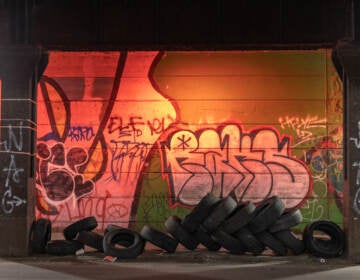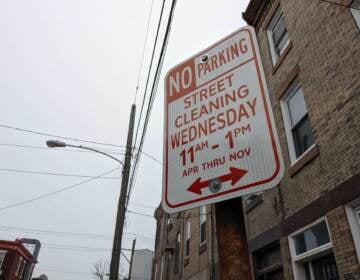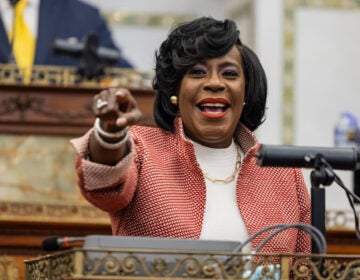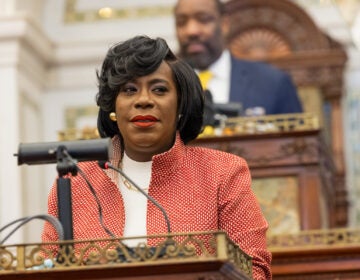Kenney’s budget proposal is just a ‘Band-Aid’ for illegal dumping, advocates say
The proposal includes a new crew to clean up illegal dumping and more street sweeping. But advocates say this doesn’t get to the root of the problem.
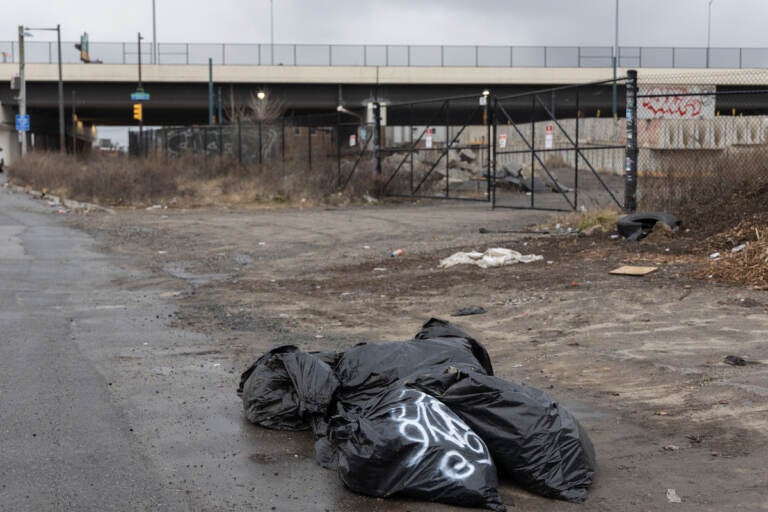
Contractor bags and a tire beside Cumberland Street by 95 in Philadelphia. (Kimberly Paynter/WHYY)
The more than $6 billion budget Mayor Jim Kenney proposed last week includes new investments in cleaning up the litter and illegally dumped debris that clog sidewalks, streets, and empty lots across Philadelphia. But people pushing for a cleaner city are disappointed.
“It’s a Band-Aid on a giant wound,” said Oskar Castro, who frequently finds tires, furniture, and other debris dumped near his Southwest Philly home. “We’ll still be dealing with the root cause of the problem.”
Illegal dumping and litter tend to be most abundant in some of the city’s poorest neighborhoods, including parts of Southwest, West, and North Philly, according to the city’s last published litter index report.
The materials released by the Mayor’s office highlight $1.8 million in the proposed operating budget for a new illegal dumping cleanup crew, which would bring the number of such crews to four, after others roll out this spring. The proposal also includes an expansion of the city’s neighborhood street sweeping program, which currently covers 14 high-litter areas of the city from spring to fall, into six new areas. This will likely cost around $5 million and include 58 new positions, said Streets Department spokesperson Keisha McCarty-Skelton.
But zero-waste and anti-dumping advocates say these new investments focus on the wrong thing: cleaning up litter and illegal dumping after it happens, rather than preventing it in the first place.
“This budget is like a dinosaur,” said Nic Esposito, director of policy and engagement at Circular Philadelphia and the city’s former Zero Waste and Litter director before the position was cut in 2020. “It’s a relic. It’s investing in the reactive strategies that have proven not to work, over and over.”
The Mayor’s total proposed budget for the Streets Department next fiscal year comes to $354 million, almost $26 million more than the current year’s budget, McCarty-Skelton said.
The Streets Department has not yet released a line-by-line spending plan for the next fiscal year. More details about the budget should emerge this spring through a series of hearings before City Council, which must approve a final version of the budget by the end of June.
A coalition of groups wants Philly’s next mayor to end illegal dumping by 2028, in part by compensating residents who clean up their own neighborhoods, “activating” vacant lots with community gardens or programming, and re-establishing the slashed Zero Waste and Litter Cabinet.
Advocates say Kenney’s final budget should include money for new prevention efforts — including a return of curbside pickup for bulk items like appliances and furniture, which ended more than a decade ago, twice-weekly trash pickup for some areas of the city, and an affordable way for would-be dumpers to dispose of bulk materials at the city’s Sanitation Convenience Centers, which are not currently open to commercial contractors.
But so far, Kenney’s budget proposal seems to be just “checking boxes,” said Maurice Sampson, eastern Pennsylvania director with the nonprofit Clean Water Action, former recycling program administrator with the city, and a member of the Waste Free Philly coalition. “There’s been a lot of political energy around street sweeping, so we’re going to have street sweeping. There’s been a lot of energy around cleanup, so let’s hire one crew. [They’re] not trying to solve the problem.”
The Streets Department already “focuses heavily on comprehensive prevention efforts,” McCarty-Skelton said in an emailed statement, pointing to a network of surveillance cameras meant to dissuade and help catch illegal dumpers, thousands of citations for sanitation violations issued so far this fiscal year, and a focus on both criminal and civil enforcement measures. But she said no new funding is being proposed for these efforts at this time.
During Council’s April 3 hearing on the Streets Department budget, officials will talk about their “Keep It Clean Philly,” program, which McCarty-Skelton described as an expanding initiative to “improve enforcement, expand cleaning and collection programs, and better engage community partnerships.” McCarty-Skelton said the initiative would involve new funding, but did not provide further details.
The Streets Department also plans to continue expanding its network of cameras next fiscal year, McCarty-Skelton said. The Department is able to carry over some funding for this, she said, aiming to increase the total number of cameras to 450 by the end of December.
Some activists want more surveillance cameras in strategic locations — such as bridges where debris gets dumped repeatedly — but others question their effectiveness, with only five Streets Department employees to watch the footage.
Lawncrest resident Dallas Herbert, Sr., has been fighting illegal dumping in his neighborhood for years. Last week, he found dozens of tires, piles of construction debris, and bags of waste on a road near his home.
“Did anybody see it?” he asked. “They spent money on cameras that’s just up there for show? I still got a lot of questions that need answering.”
Herbert, a member of the 215 People’s Alliance, wants to see money in the budget for staff to monitor the cameras. Instead, he said, the city seems to want to spend “a little more money for the same old thing.”
The Mayor’s five-year plan, also released last week, includes continued use of cameras, collaboration with other departments and agencies on legal action against dumpers, publicity around consequences for illegal dumping and legal disposal options, and completion of a new litter index every two to three years.
But these long-term plans are fluid. Next year, a different mayor will propose a new five-year plan. And there aren’t specific funding requests attached to these goals yet, Esposito said.
“Why not do it right now?” he said. “These are things that could be done right now.”

Subscribe to PlanPhilly
WHYY is your source for fact-based, in-depth journalism and information. As a nonprofit organization, we rely on financial support from readers like you. Please give today.




